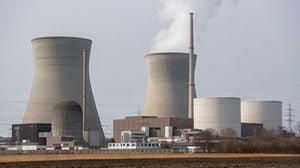

Kenya to build nuclear power plan
Kenya aims to commence construction of its inaugural nuclear power plant in 2027, part of the country’s efforts to expand its energy sources in response to increasing demand and the pursuit of zero-carbon energy solutions.
This development follows the green light granted by the International Atomic Energy Agency (IAEA) allowing Kenya to proceed with the establishment of the necessary infrastructure for these nuclear power plants.
Acting CEO of the Nuclear Power and Energy Agency (NuPEA) Justus Wabuyabo, says the agency has advanced plans to float international tenders for the construction.
“We will do the bidding stage, as anytime between 2026 and 2027 and start construction in 2027. Construction ranges six to ten years so we are looking at 2034-35 to commission the first plant” he said.
” We are now focusing on Kilifi and Kwale as our ideal sites. They have met most of the criteria but before we determine the final site we have to do a detailed scientific study as provided for by IAEA like seismic tests,” he added.
Once completed, the plant is projected to generate 1,000 Megawatts (MW) of electricity. This significant capacity is poised to play a pivotal role in enhancing the nation’s power supply, reducing dependence on environmentally harmful thermal plants, and contributing to a cleaner energy future.
Kenya’s pursuit of a nuclear power plant aligns with the anticipation of a surge in electricity demand, a strategic move as the country aims to achieve middle-income status.
Geothermal energy accounted for the biggest share of the electricity generated as of May with a share of 45.21 percent followed by hydro (21.05 percent), wind (16.08 percent), and solar at 3.92 percent.
In recent years, Kenya has intensified its efforts to realize its nuclear energy aspirations. As part of this endeavor, the country has been sending numerous students abroad to advanced economies with established nuclear energy programs. This initiative aims to enhance the skill sets of these students and reduce the need for importing foreign labor in the future.
















